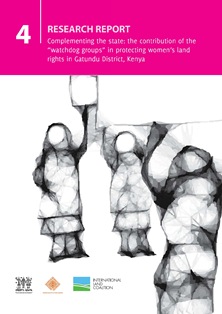Resource information
In the experience of GROOTS Kenya, HIV-positive widows are often thrown out of their matrimonial homes, their land grabbed by in-laws as they are blamed for their husbands’ deaths and/or feared to die within a short period of time. Due to a lack of awareness on land rights, as well as the importance of retaining legal documents to lodge court cases, the ability of widows and orphans to control land and other family assets in Gatundu district is threatened. To address this situation, grassroots communities assisted by GROOTS Kenya have formed community land and property watchdog groups (WDGs) to protect widows and orphans from losing their land and property through disinheritance and asset stripping.
WDGs members receive referrals from home-based care providers, gather information about vulnerable members of the community and use this information to protect and preserve the rights of those unable to afford or access formal legal services. If necessary, they link them to the formal justice system via partners who offer legal aid. This research looks into how the WDGs protect widows and vulnerable children against land rights violations and how they empower the community through monitoring and awareness creation.
You can download this publication from the website of the International Land Coalition or below. A policy brief is also available.
This work was carried out as part of a 3-year collaborative project entitled “Securing Women’s Access to Land: Linking Research and Action”, coordinated by the International Land Coalition (ILC), the Makerere Institute for Social Studies (MISR) of Makerere University in Uganda, and the Institute for Poverty, Land and Agrarian Studies (PLAAS) of the University of Western Cape in South Africa. This report is part of a wider initiative on Women’s Land Rights. If you would like further information on the initiative and on the collaborating partners, please feel free to contact the International Land Coalition.

